
On December 8, we celebrate World Climate Day, created at the initiative of several NGOs as a reminder of the threat of global warming and the need to act to limit its effects.
The aim of this day is to raise public awareness of climate change issues, and to expose the ever-increasing impacts they are having on our Earth.
With 47% of its projects dedicated to access to renewable and sustainable energies and to biodiversity in 2023, the ENGIE Foundation is committed to the environment year after year. The aim is to participate in ambitious, high-impact projects and to contribute to the collective effort of the Agenda 2030 through the achievement of the Sustainable Development Goals (SDGs) and carry ENGIE’s raison d’être: this is what guides the ENGIE Foundation’s action daily.
With the 28th UN Conference of the Parties on Climate Change (COP 28) taking place until December 12, this day is an opportunity to highlight the commitments of the ENGIE Foundation alongside its partners.
The ENGIE Foundation is acting for the climate around 2 themes
- Support for research and innovation
- Concrete action to combat global warming
ENGIE FOUNDATION PARTNERS MEET AT COP28
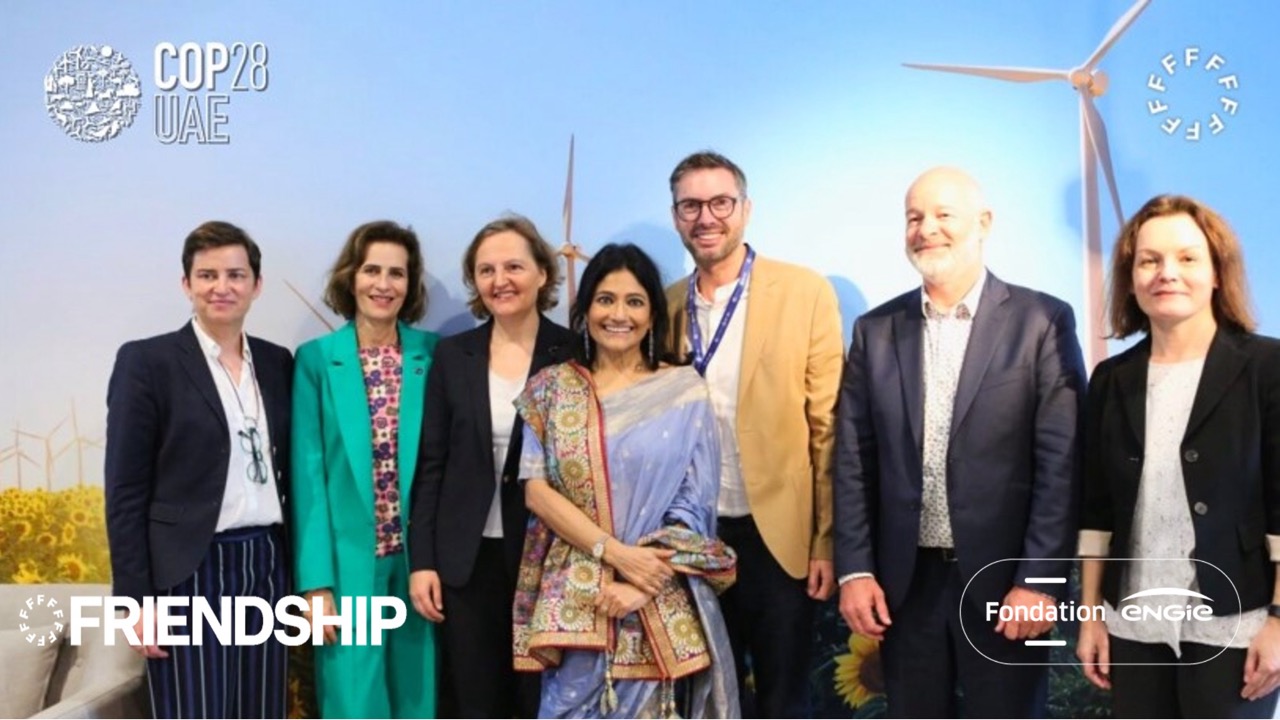
Claire Waysand, Executive Vice President of ENGIE in charge of Corporate Secretariat, Strategy, Research & Innovation and Communications and Vice President of the ENGIE Foundation, took part alongside Runa Khan, Founder of Friendship, at the round-table “How can corporate commitments to sustainable development contribute to access to renewable energies, biodiversity protection and climate adaptation for greater prosperity, including in developing countries?”

Claire Waysand recalled the ENGIE Foundation’s historic and innovative commitment to Friendship in 3 areas
- A model solar village, which has given rise to two other projects financed by the Government of Bangladesh.
- A mangrove replanting project
- Connected schools
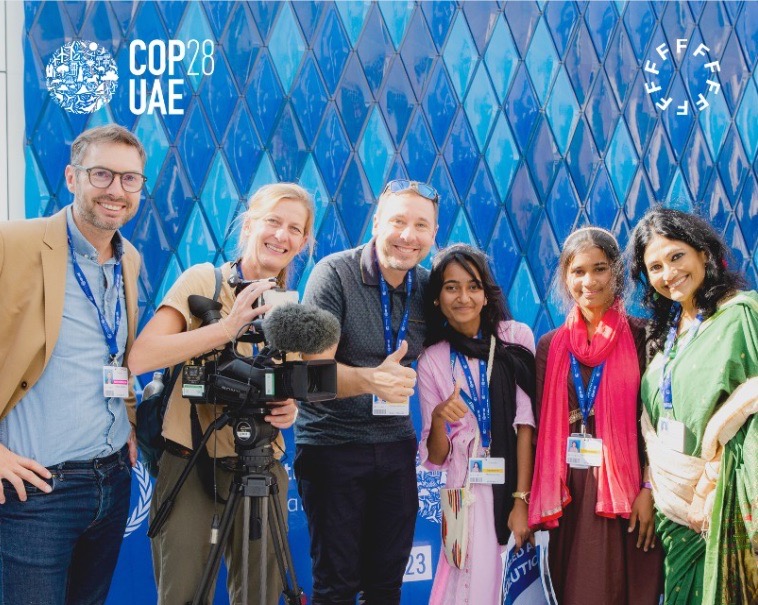
The COP28 also provided an opportunity to meet two Bangladeshi ambassadors for Friendship France’s “Écoles Connectées” project, supported by the ENGIE Foundation: Biuti Akter and Ronzana Akter, alongside Runa Khan, Founder and Executive Director of Friendship NGO, and Nasrul Hamid, Bangladesh’s Minister of Energy.
Watch the replay of the Arte interview with Biuti Akter and Ronzana Akter: https://www.arte.tv/fr/videos/117976-000-A/la-cop28-tribune-des-victimes-du-dereglement-climatique/

The ENGIE Foundation is proud to support this connected schools project, which links French middle and high schools with secondary schools in Bangladesh, on solutions for adapting to climate change.
The project encourages students to share innovative solutions for coping with climate change: logistical or behavioral adaptations, changes in practices and lifestyles, etc. By taking a stand on these issues, they can become agents of change, raising awareness in civil society (fellow students, parents, associations, etc.).
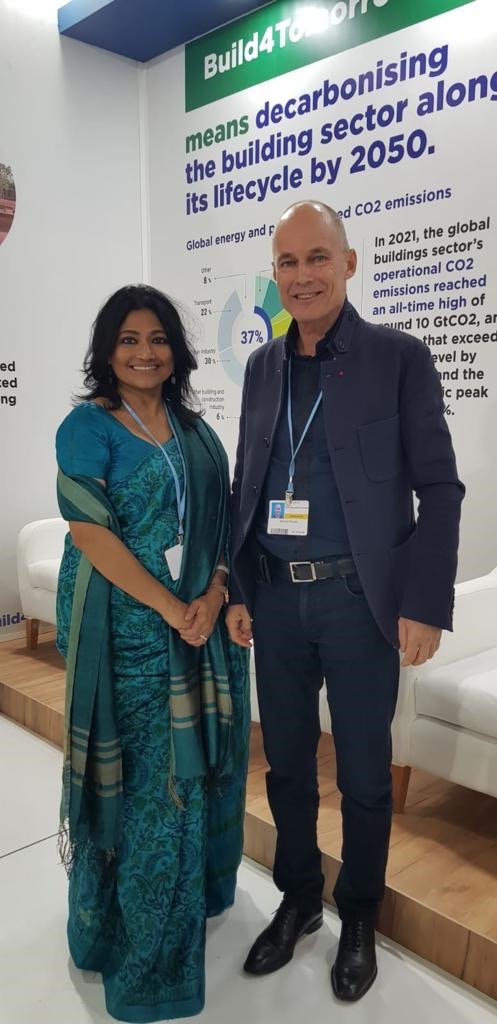
At COP28, Bertrand Piccard presented the new climate narrative of the SOLAR IMPULSE Foundation: A STRATEGY TO OVERCOME RESISTANCE TO ECOLOGICAL TRANSITION.
“It’s imperative to design a new narrative and replace the one that hasn’t worked in the past. What we are asking for is nothing less than a revolution in the way we talk about climate action.”
Bertrand Piccard
President of the Solar Impulse Foundation
More information: https://solarimpulse.com/le-nouveau-narratif-du-climat
FIGHTING THE EFFECTS OF GLOBAL WARMING AND IMPROVING LIVING CONDITIONS IN BANGLADESH WITH FRIENDSHIP
For over 10 years, the ENGIE Foundation has been working alongside the NGO Friendship to build community capacities, encourage major contributions from women, facilitate access to solar energy and training, and protect biodiversity.
Restoration of 14 hectares of mangroves in southern Bangladesh
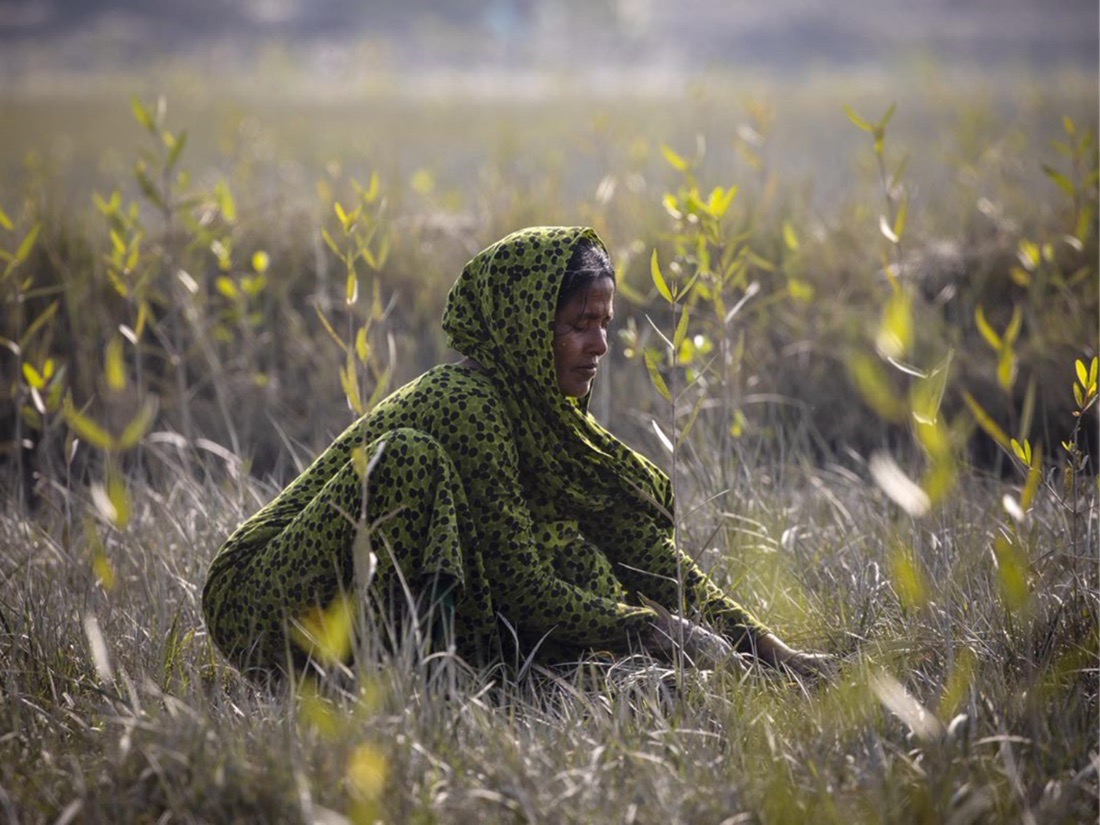
One of Bangladesh’s greatest assets is the world’s largest mangrove forest, the Sundarbans, a UNESCO World Heritage Site. Unique and diverse coastal ecosystems, mangroves are a formidable tool in climate change mitigation thanks to their high CO2 absorption capacity.
However, many mangrove reforestation projects in Bangladesh are not sustainable because they consist of non-resilient monocultures, are not effectively managed during the growth phase, are sometimes planted with species not adapted to the area or fail to take socio-economic factors into account.
Plantation of 14 hectares in 3 areas located in 3 villages in the Satkhira district (land is a scarce commodity in Bangladesh and it is difficult to have single plots available for reforestation).
The first two areas (30,000 trees) were planted in October 2022 by local communities under the supervision of Friendship and local forestry experts. The third (12,000 trees) is scheduled for May 2023. In all, almost 2,000 meters of dikes will be protected against flooding thanks to this project, bearing in mind that the damage caused by salt water can persist for an exceptionally long time (flooded soil becomes unfit for cultivation for years, just as a livestock pond invaded by salt water can no longer be used).
Six community groups of 30 people received capacity-building training (prior to planting) in seeds, nurseries and planting; they also each took part in the first follow-up meetings.
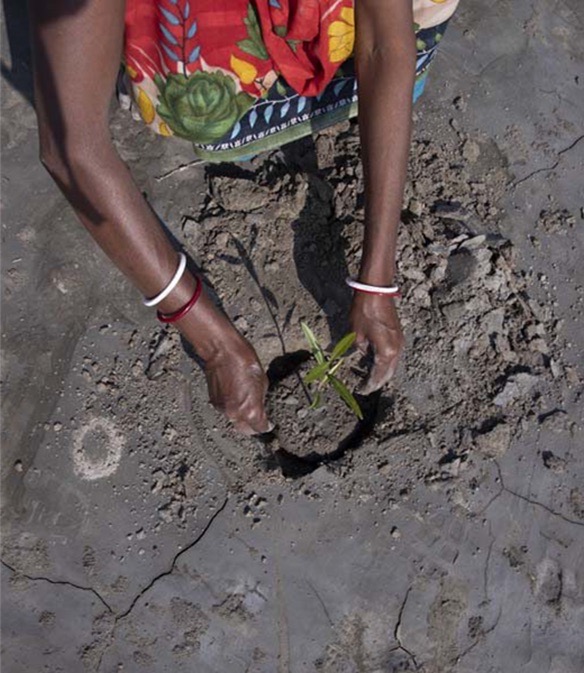
IMPACT: over the 3 zones, 240 participants will be trained, corresponding to between 1,200 and 1,440 direct beneficiaries (family members). Indirect beneficiaries will be far more numerous. They include all the villagers, farmers and fishers who will see their homes, fields and ponds protected from flooding and salinization.
Energy to improve living conditions in Bangladesh
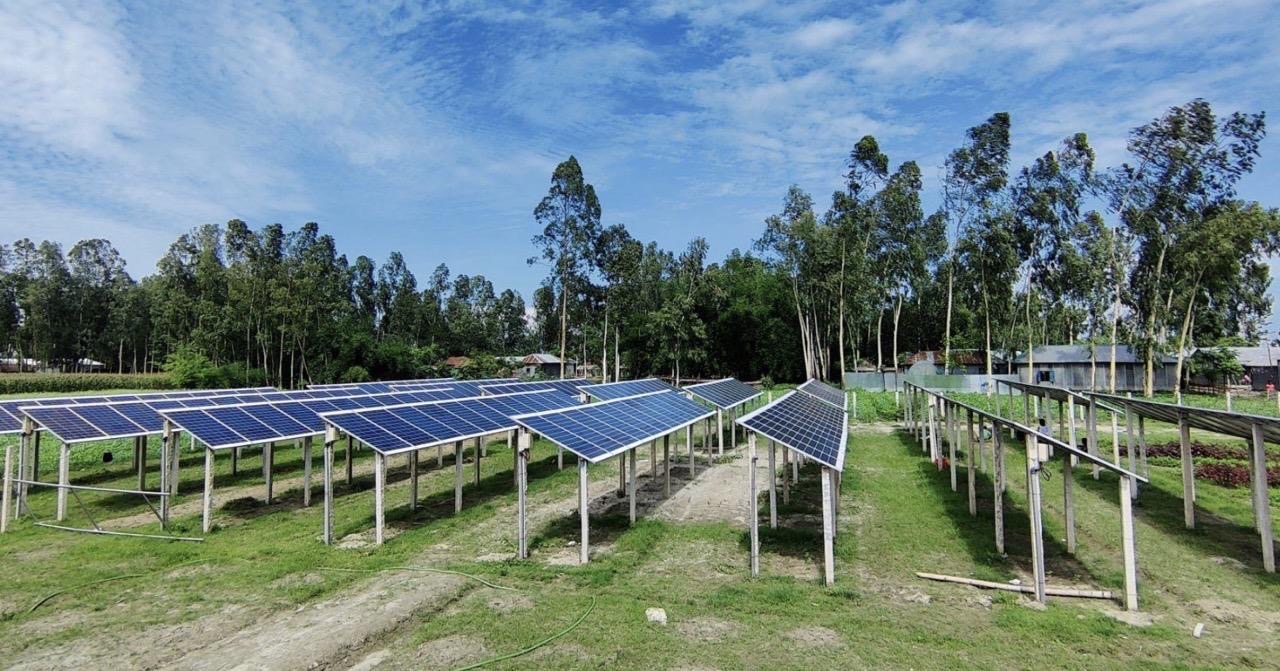
Since 2011, with the support of the ENGIE Foundation and Energy Assistance France, the NGO Friendship has been developing a sustainable rural electrification project for remote villages in Bangladesh.
Friendship has designed and installed the first solar-powered electricity microgrid in the tanks of northern Bangladesh, inaugurated on August 22, 2021, in the presence of Mr. Nasrul Hamid, Bangladesh’s Minister of Electricity and Energy.
The solar village, built in the village of Goynar Potol, is now operational, bringing well-being, prosperity and satisfaction to its inhabitants. The population of the Goynar Potol tank has grown considerably. The village grew from 150 to over 500 houses in early 2022, due to the arrival of people who had left other islands that disappeared during the exceptional floods of 2020.
The solar village in figures:
- 3,000 inhabitants of Goynar Potol now have access to electricity
- 54 kWp of electricity generated by solar panels and stored in batteries
- 200 solar panels and 200 batteries installed
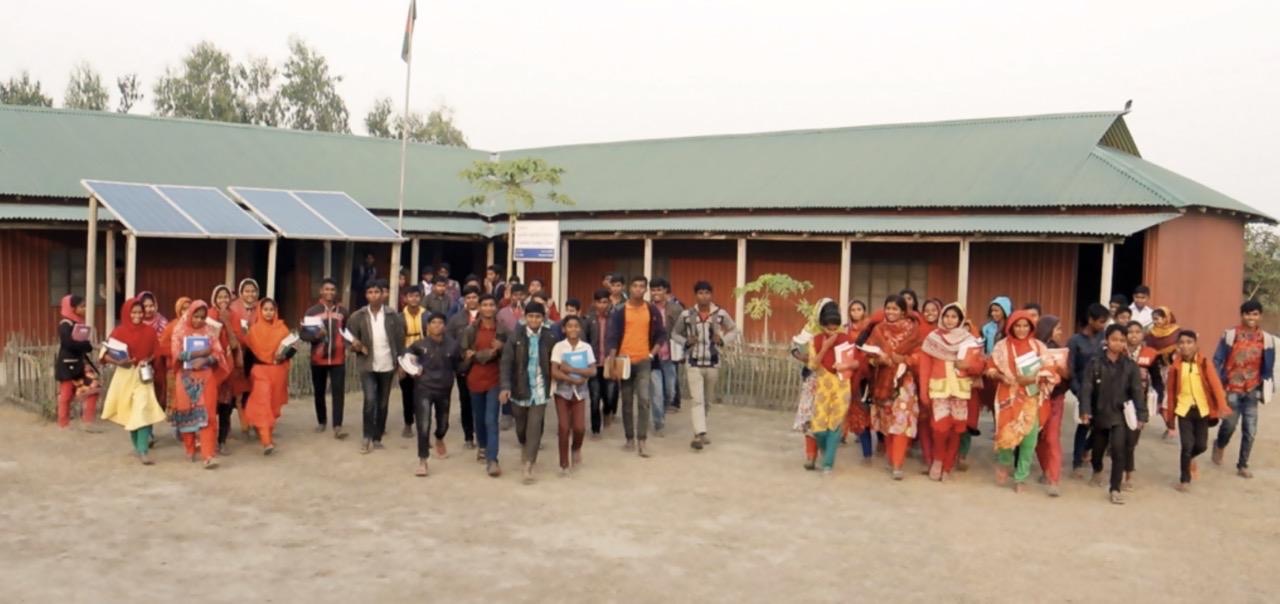
Thanks to the electricity generated and stored, every household will be able to operate lamps, fans, televisions and cell phone chargers daily. Light provides security at night and access to healthcare. Stores can stay open in the evening, generating new income for shopkeepers. Children can study in the evenings and follow lessons broadcast on television.
In 2023, Friendship and the ENGIE Foundation will ensure the continuity and technical optimization of the operation of the Goynar Potol solar village, as well as the strengthening of local capacities through a training plan to guarantee the sustainability of both the solar village and electrification in these remote areas of the country.
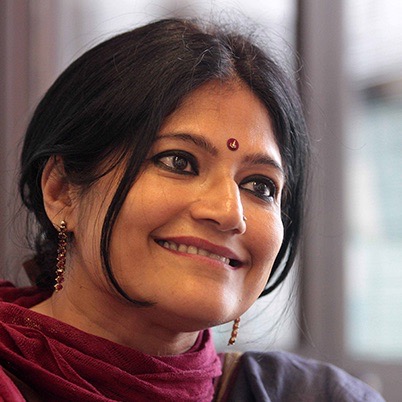
Interview with Runa Khan, Founder and Executive Director of Friendship
✷ Why this commitment to a Mangroves program and this new development for biodiversity?
My country is one of the hardest hit by climate change in the world. Every year, cyclones, floods and storms follow one another and punctuate the daily lives of the population. It is worth noting that their frequency and intensity are increasing due to global warming, forcing communities to move 25 times in their lifetime! By 2050, to escape the consequences of climate change, a third of the population of Bangladesh will have to move – the equivalent of the entire population of France!
To the south, in the Bay of Bengal, salt water from the Indian Ocean is eroding riverbanks and ruining cultivated land for years to come. Here lies the Sundarbans Forest, the world’s largest mangrove swamp. It covers the delta of the Ganges, Brahmaputra and Meghna rivers. This site is world-renowned for the richness of its fauna: 260 bird specimens, 400 fish, between 250 and 300 Bengal tigers and other endangered species, but it is also a very fragile ecosystem: due to pollution, over-industrialization and deforestation, the mangrove has lost 20% of its surface area in twenty years.
Since 2017, Friendship has been carrying out a vast mangrove reforestation project, which is essential for environmental protection and socio-economic development in the region: this ecosystem now provides many added resources for local communities (crabs, shrimps…) and limits saltwater intrusion into fertile land by acting as natural dikes.
✷ How do you see this program? What are the challenges?
For a reforestation project to be sustainable, it must be designed considering all the environmental and social-economic factors of the region. We face several challenges to ensure long-term effects:
- choosing resilient crops: we need to identify the right species of tree to plant in the right place, depending on the nature of the soil, the topography of the land and the amount of sunlight
- protecting the trees throughout their growth period: it takes 5 years for nursery trees to mature before they can be replanted in the mangrove. These trees need to be protected from goats that come to eat them and prevented from being destroyed by communities for resale or personal use. To achieve this, it is vital to include the communities in the development of the project! This is one of the key factors for success: community support for the project and their involvement at every stage of implementation. This ensures ownership of the project and the sustainability of the plantation. People who have planted the trees themselves and know the importance of mangroves to their living conditions will naturally take care of them.
We have developed a solution that meets 3 objectives:
- plant at least 5 different tree species over hundreds of hectares along tidal rivers to guarantee respect for biodiversity and encourage the development of a new terrestrial or aquatic ecosystem.
- include local residents and diversify their livelihoods to avoid degradation of the plantations by poverty-stricken communities.
- involve local authorities and strengthen their cooperation with local populations.
We launched this program in 2017 thanks to the support of the Luxembourg Cooperation and I would like to thank the ENGIE Foundation for partnering with Friendship to extend these activities over 14 hectares of mangroves.
Thanks to the support of the ENGIE Foundation, Friendship can carry out these activities on 14 hectares in 3 areas of the region: 10 hectares have already been planted in the villages of Horishikhali and Jhapa and 4 hectares will be planted in May/June 2023 in the village of Chakla. Today, 70 people are working on the project with the ENGIE Foundation.
What is more, we noticed that each replanted tree gave birth to 2 or even 3 new trees within two years! This exponential growth shows a strong environmental and socio-economic impact for years to come.
THE ENGIE FOUNDATION PARTNERS THE SOLAR IMPULSE FOUNDATION
Efficient solutions for clean economic growth
To meet ecological challenges without undermining economic growth, Bertrand Piccard and the Solar Impulse Foundation have identified 1000+ clean, cost-effective solutions. The Solar Impulse Foundation has organized these solutions into a research engine for climate action – the Solutions Explorer – to support their large-scale implementation. By giving political and economic decision-makers the tools to adopt far more ambitious energy and environmental policies, the Foundation will help them to establish a roadmap for achieving their environmental goals.
The ENGIE Foundation partners the Solar Impulse Foundation’s “City of Tomorrow, an exploration in 1000+ solutions” exhibition.
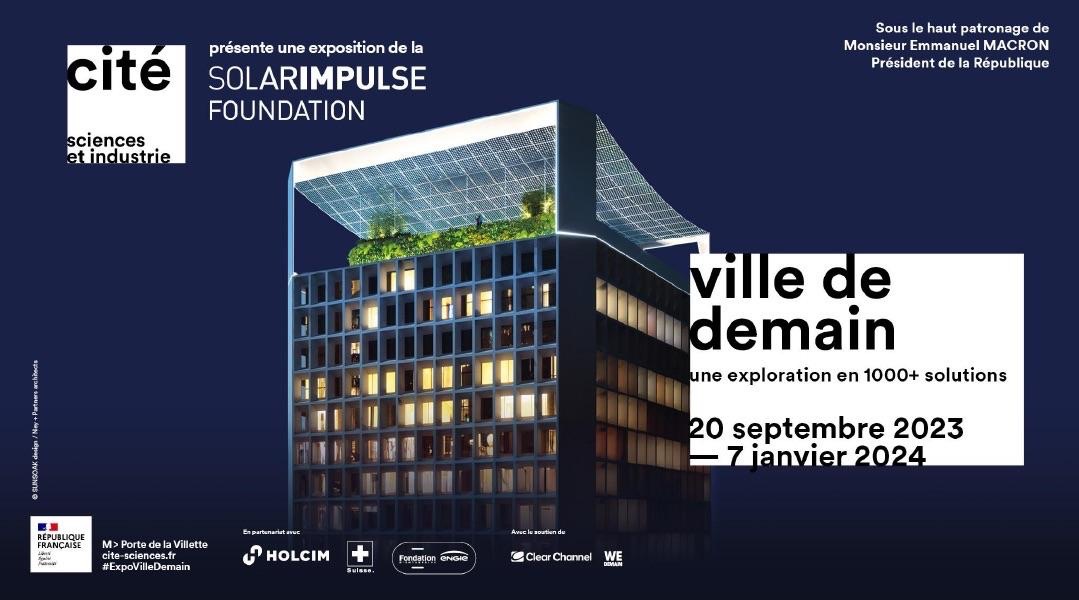
From September 20, 2023 to January 7, 2024, the Cité des Sciences et de l’Industrie, with the support of the ENGIE Foundation, is hosting “Ville de demain, une exploration en 1 000+ solutions”, an exhibition designed by the Solar Impulse Foundation, chaired by Bertrand Piccard.
Echoing the “Urgence climatique” exhibition at the Cité des Sciences, the “Ville de demain, une exploration en 1 000+ solutions” exhibition, focusing on the challenges of ecological transition in urban environments, invites the public to explore the many innovative approaches that today’s technologies offer to protect the environment while promoting economic development. A fun-filled tour takes visitors on a journey of discovery through concrete, efficient proposals developed in the fields of energy, water, construction, sustainable housing, mobility and waste management.
As a partner of the SOLAR IMPULSE Foundation and a member of the Cité des Sciences et de l’Industrie partners’ club, the ENGIE Foundation focuses on environmental education, raising awareness of the fight against global warming and the preservation of biodiversity, and aims to make younger generations more aware of the challenges of ecological transition.
Our world is in the throes of change, and cities, which account for 75% of CO2 emissions, must urgently commit to the ecological transition. It’s this transformation that the City of Tomorrow, an exploration in 1,000+ solutions exhibition invites visitors to discover, by appealing to our collective boldness and ability to believe together in our potential for change: how can we move from rhetoric to the concrete application of innovative solutions, capable of mobilizing individuals, entrepreneurs and politicians to build a clean, collective, sustainable city?
In a pioneering spirit that aims to be constructive and non-partisan, with eco-explorer Bertrand Piccard as our guide, the exhibition offers visitors a unique insight into urban ecological issues and the sustainable solutions that exist today to meet them, with concrete applications in different cities.
